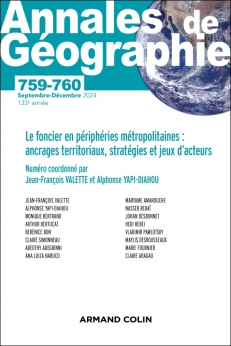
ANNALES DE GÉOGRAPHIE N°759-760 (5-6/2024)
Pour acheter ce numéro, contactez-nous
Recevez les numéros de l'année en cours et accédez à l'intégralité des articles en ligne.
Les dynamiques d’urbanisation en Afrique font l’objet d’une attention académique croissante portant sur l’étalement urbain et le déploiement des grands projets urbains. Cependant, le caractère composite des paysages comme celui du sud du Bénin, marqués par les traces des limites parcellaires, invite à compléter ces perspectives par une analyse attentive à la diversité des forces en jeu. Cet article analyse les transformations du contrôle foncier dans les franges métropolitaines du sud du Bénin, à partir d’enquêtes de terrain dans des localités infracommunales et des données secondaires. Il met en évidence trois logiques de transformations foncières ordinaires : les mutations des mondes ruraux en matière de pratiques et normes foncières, les aspirations sociales à la propriété, la financiarisation populaire du foncier. En somme, les logiques de transformations foncières métropolitaines sont diverses, elles émanent à la fois d’une demande urbaine et de forces endogènes aux mondes ruraux. Cet article contribue au débat sur l’urbanisation dans les Suds en soulignant l’intérêt de dépasser une approche urbano-centrée des transformations métropolitaines, en développant des lunettes d’analyse pluridisciplinaires, faisant dialoguer en particulier études urbaines et études rurales.
The dynamics of urbanization in Africa are the subject of increasing academic attention, with a focus on urban sprawl and the deployment of large-scale urban projects. However, the composite character of landscapes such as that of southern Benin, marked by the traces of parcel boundaries, invites us to complement these perspectives with an analysis more attentive to the diversity of forces at play. This article analyzes the transformations of land control in the metropolitan fringes of southern Benin, based on fieldwork in sub-municipalities and secondary data. It identifies three logics of ordinary land transformations : the mutations of rural worlds in terms of land practices and norms, social claims to ownership, and the popular financialization of land. In short, the logics of metropolitan land transformations are multiple, emanating from both urban demand and forces endogenous to rural worlds. This article contributes to the ongoing debate on urbanization in the Global South by emphasizing the necessity to move beyond a city-centric approach to metropolitan transformations. In particular, it advocates for the development of multidisciplinary analytical lenses that integrate urban and rural studies, particularly in the context of metropolitan transformations.